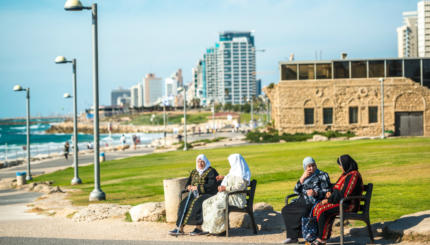During the late 19th and early 20th centuries, two competing national movements began to take shape: Zionism and Arab nationalism. Zionism called for some form of Jewish sovereignty in at least some part of the Land of Israel as a Jewish necessity and right. Arab nationalism saw the Arab world as a unified whole. As individual countries gained independence, they sought to balance a specific, local identity with a broader pan-Arab affiliation.
The nascent nationalist movements were on a collision course. At the root of the conflict were complex networks of identity construction and competition over natural resources, such as territory and water, and psychic resources, such as pride, honor, and power.
The Zionist movement in the years prior to and continuing after Israeli independence in 1948 had to face the question: Are the Arab inhabitants of the Land of Israel a unique ethnic-national community with distinct political rights? For its part, the Arab national movement asked: Do the Jews have moral and political rights to some form of sovereignty in Palestine?
Arabs in Palestine?
Among the early Zionist thinkers, there were those who were ignorant regarding the indigenous population of Palestine. Others believed that the modernizing results of Jewish presence in Palestine would benefit the Arabs.
With your help, My Jewish Learning can provide endless opportunities for learning, connection and discovery.
Amos Elon, author and veteran Israeli journalist, relates a telling anecdote about Theodor Herzl, the “father” of modern Zionism. Max Nordau, Herzl’s chief lieutenant, once approached Herzl in a flurry, saying: “But there are Arabs in Palestine! I didn’t know that! We are committing an injustice.”
Whether or not this story is legend or history, it is fair to say that Herzl did not regard the Arab population of the Land of Israel as a significant obstacle to the fulfillment of the Zionist enterprise. In The State of the Jews, Herzl’s political program for Jewish statehood, there is no mention of the Arabs. However, in his utopian novel, Altneuland, Herzl’s representative Arab character, Reschid Bey, thanks the Jews for bringing European style progress and economic prosperity to the desolate and decrepit Middle East.
Other Zionist leaders echoed Herzl. They held to the faith that the Zionist movement would, in time, be welcomed by the local peoples of the Middle East as a harbinger of development and modernization.
However, other voices within the Zionist movement challenged the optimism of deterministic progress. Ahad Ha-am, Herzl’s most potent critic, saw early on that Arab opposition to Zionism would not be easily assuaged. After a visit to the new Yishuv, Ahad Ha-am wrote:
We tend to believe abroad that Palestine is nowadays almost completely deserted, an uncultivated wilderness, and anyone can come there and buy as much land as his heart desires. But in reality this is not the case. It is difficult to find anywhere in the country Arab land which lies fallow . . .
We tend to believe abroad that all Arabs are desert barbarians, an asinine people who does not see or understand what is going on around them. This is a cardinal mistake…. The Arabs, and especially the city dwellers, understand very well what we want and what we do in the country…
But when the day will come in which the life of our people in the Land of Israel will develop to such a degree that they will push aside the local population by little or by much, then it will not easily give up its place.” (“Truth from the Land of Israel,” The Complete Writings of Ahad Ha-am, 1946, p. 29.)
Palestinian Nationalism
As a distinct national entity and movement, the Palestinian community went through a process of historic gestation from the 1920s and continuing through 1967. Palestinian national identity emerged as a reaction against the British Mandate and the growth of the Yishuv. Local Arab violence that began as sporadic mob actions in 1920 and 1921 was transformed into organized political and military action in the Arab revolts of 1929 and 1936-1939.
Israel’s War of Independence, and the exodus of approximately 700,000 Palestinians — an event Palestinians refer to as the Nakba, or catastrophe — not only remains a central problem of the continuing conflict, but further cemented a shared sense of Palestinian history, memory, and suffering central to the formation of a national movement. Israel’s victory in the Six Day War of 1967 and its subsequent occupation of the West Bank and the Gaza strip — home to millions of Palestinians, including many who fled Israel in 1948 — increased Palestinians’ grievances.
In the early 1990s, Israel and the Palestinians began peace negotiations, which many people hoped would lead to a resolution of the ongoing conflict, particularly a two-state solution in which Palestinians would establish a state alongside Israel. For a variety of reasons, these negotiations — and multiple efforts following them — have failed.
During the British Mandate, several schools of thought developed regarding Jewish-Arab relations within the Zionist movement. The positions of three figures are crucial: Martin Buber, Zev Jabotinsky, and David Ben Gurion.
Martin Buber and the Push for a Bi-National State
Although Buber only immigrated to the Land in 1939 at the age of 59, he spent an enormous portion of his adult life committed to Zionism. In Buber’s conception, a Zionism that aspired to create a Jewish version of Albania or even of Switzerland fell short of the Jewish people’s religious-political mission in the world.
In his mind, a Zionism that embraced the realpolitik principle that all means justify the ends betrayed the Jewish challenge–to build a society that embodied in its political behavior and policy the prophetic concern with justice and peace.
Buber–and a number of key Central European Zionist activists and intellectuals, including Shmuel Hugo Bergman, Gershom Scholem, and Henrietta Szold–participated in political organizations like Brit Shalom and the Ichud, which worked toward Jewish-Arab rapprochement. Zionism would succeed, they argued, only if it would find a way to reconcile the equally legitimate claims of both Jews and Arabs to some form of national self-determination in the Land of Israel.
Their insistence on an equality of national rights led them to support voluntary Jewish limits on immigration as a tactic to build trust with the Arabs, and the establishment of a bi-national state where both groups would find national-cultural expression through a sharing of political power.
Ze’ev Jabotinsky and Revisionist Zionism
Zev Jabotinsky, the founder of Revisionist Zionism–which supported the creation of a Jewish state on both sides of the Jordan River–championed a radically different position.
Jabotinsky held that Arab opposition could not be bought off with promises of the benefits that Jewish immigration and settlement would bring to the region. He criticized Buber and the Zionist labor movement, among others, as being political amateurs who underestimated the necessity of military force in compelling a reluctant Arab acquiescence to Zionism. Arab opposition to Zionism was of a national character, he believed, and it was self-defeating to expect that the Arabs would consent to Jewish plans for mass immigration, organized Jewish settlement, and eventual statehood.
In a pivotal article published in 1924, Jabotinsky called for the establishment of an “Iron Wall”–a military force that would force the Arabs into accepting the objective strength and permanence of the Zionist enterprise. Arab acquiescence, he believed, could be achieved through military deterrence, active British cooperation with the Yishuv, and clear public articulation by the Zionist movement of its goal to establish a Jewish state.
Although Jabotinsky rejected the possibility that Jews and Arabs could both satisfy their national aspirations within the British Mandate, he advocated that within the context of a Jewish state the religious and civil rights of Arab citizens had to be honored and protected.
David Ben Gurion and the Establishment of the State of Israel
David Ben Gurion, Israel’s first prime minister, rejected the notion that the Arab residents of the Land of Israel possessed a national claim to the land equal to that of the Jewish people. Ben Gurion recognized the emergence of Arab nationalism throughout the Middle East, but rejected the idea that the Arabs of Palestine represented a separate national group with a competing claim to Zionism.
As a socialist, Ben Gurion sought to reconcile Arab human, civil and political rights with the project of constructing a Jewish state. As a Zionist, Ben Gurion’s primary commitment, especially in the wake of the Holocaust, was to ensuring the development of a Jewish national home as the historic successor to the British Mandate. With the establishment of the state of Israel in May 1948, questions of ideology faced the brunt of pragmatic implementation with the invasion of Israel by the Arab armies.
Continuing Conflict
In the decades since, as much has changed as has remained the same in the complex relations between the state of Israel and the Palestinian national movement. At the root of the conflict lies a clash between two claims, two rights, and a shared tragedy. Looking back, the Israeli novelist Amos Oz adds:
Well, my definition of a tragedy is a clash between right and right. And in this respect, the Israeli-Palestinian conflict has been a tragedy, a clash between one very powerful, very convincing, very painful claim over this land and another no less powerful, no less convincing claim.
Now such a clash between right claims can be revolved in one of two manners. There’s the Shakespeare tradition of resolving a tragedy with the stage hewed with dead bodies and justice of sorts prevails. But there is also the Chekhov tradition. In the conclusion of the tragedy by Chekhov, everyone is disappointed, disillusioned, embittered, heartbroken, but alive” (“Coping With Conflict,” PBS, Jan. 23, 2002).
The unfolding story of the conflict, unlike the works of Shakespeare and Chekhov, remains a work in progress. As for the conclusion, although still hidden, it is every day written anew by the protagonists themselves.


